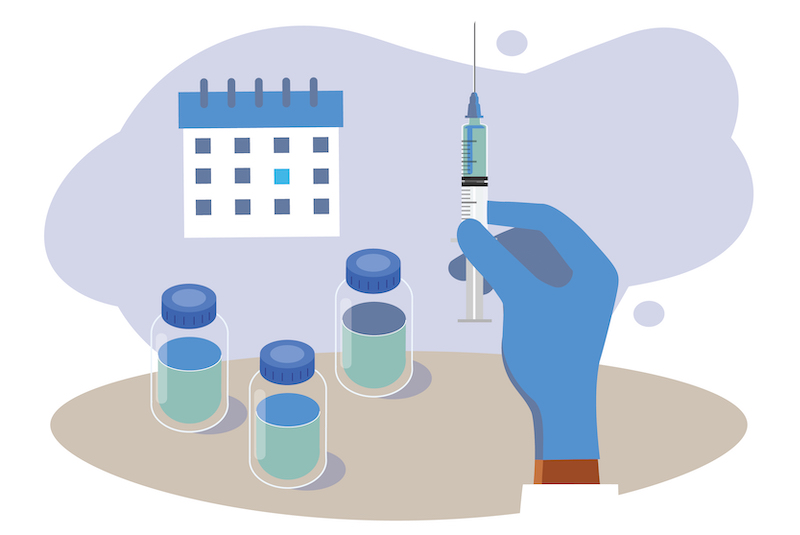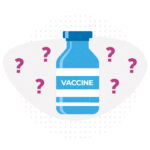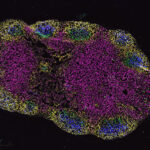What you need to know about the new COVID-19 vaccine

Today, the Food and Drug Administration (FDA) granted Johnson and Johnson (J&J) emergency use authorization for its COVID-19 vaccine. We spoke with Dr. Thomas Sandora, hospital epidemiologist at Boston Children’s Hospital, to learn more about this new vaccine, including how effective it was in clinical trials and how it compares with the two COVID-19 vaccines currently used in the U.S.
How does the J&J vaccine work?
Just like the Pfizer and Moderna vaccines currently used in the U.S., the J&J vaccine activates your body to make antibodies against the SARS-CoV-2 virus. However, instead of being mRNA-based like the other two, this new vaccine is known as a viral vector vaccine. That means it uses an inactivated virus, in this case an adenovirus, which can’t replicate inside the body. Other examples of vaccines that use a viral vector include several against influenza, respiratory syncytial virus (RSV), HIV, and malaria.
Adenoviruses are viruses that can cause common colds and other respiratory infections. J&J’s vaccine includes a harmless human strain called adenovirus 26.
As opposed to the Pfizer and Moderna vaccines, which require two shots three to four weeks apart, the J&J vaccine only requires one dose. The company is conducting a two-dose trial, however, with the shots spaced 57 days apart to see if it provides even more protection. Because it only requires normal refrigeration compared with sub-freezing temperatures for the Pfizer and Moderna vaccines, J&J’s vaccine is also easier to transport and store.
My advice is that people should get vaccinated as soon as any vaccine becomes available to them because the supplies are unpredictable.”
Dr. Thomas Sandora
How effective is it?

The clinical trials for this vaccine studied its ability to prevent moderate and severe disease from COVID-19. Nearly 44,000 people, age 18 and older, participated in the trial in several regions around the world.
“Overall, the vaccine is quite effective against severe illness but it may be less effective against more moderate illness,” says Sandora.
Results from the trial showed that one dose of the J&J vaccine:
- was 66 percent protective overall against moderate to severe COVID-19 disease in adults 18 years and older
- was 85 percent effective against severe disease alone from COVID-19
There were no COVID-19-related hospitalizations or deaths in the clinical study.
In comparison, the Pfizer and Moderna vaccines are about 95 percent effective against symptomatic COVID-19. However, “all three vaccines — J&J, Pfizer, and Moderna — are effective against severe disease and death from COVID-19, which is really what we’re trying to prevent,” Sandora notes. “My advice is that people should get vaccinated as soon as any vaccine becomes available to them because the supplies are unpredictable.”
What are the side effects?
Overall, the side effects look pretty similar to those from the mRNA vaccines. About half of those receiving the J&J vaccine had non-severe pain at the site of the injection, a bit less frequently than with the mRNA vaccines. The other common symptoms were headache and fatigue (about 40 percent), followed by muscle aches (33 percent), nausea (14 percent), and fever (9 percent). There were no cases of extreme allergic reactions to the vaccine.
When can my child get the vaccine?
The clinical trial on which J&J based its FDA application included only adults aged 18 and older. The company has announced it will begin clinical trials in children ages 12 to 17 but has not provided any further details. The Pfizer and Moderna vaccines are both now in clinical studies in children ages 12 and older.
Learn more about COVID-19 vaccination.
Related Posts :
-

Model enables study of age-specific responses to COVID mRNA vaccines in a dish
mRNA vaccines clearly saved lives during the COVID-19 pandemic, but several studies suggest that older people had a somewhat reduced ...
-

Will people accept a fentanyl vaccine? Interviews draw thoughtful responses
In 2022, more than 100,000 people died from opioid overdoses in the U.S., according to the National Center for Health Statistics. ...
-

New insight into the effects of PPIs in children
Proton-pump inhibitors (PPIs) are frequently prescribed to suppress stomach acid in patients with gastroesophageal reflux disease (GERD). Prescribing rates of ...
-

Creating the next generation of mRNA vaccines
During the COVID-19 pandemic, mRNA vaccines came to the rescue, developed in record time and saving lives worldwide. Researchers in ...





